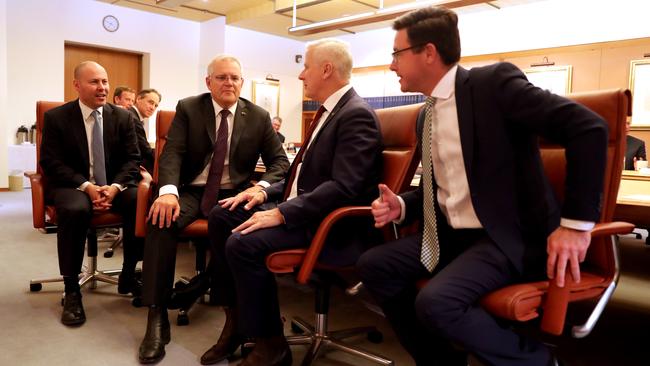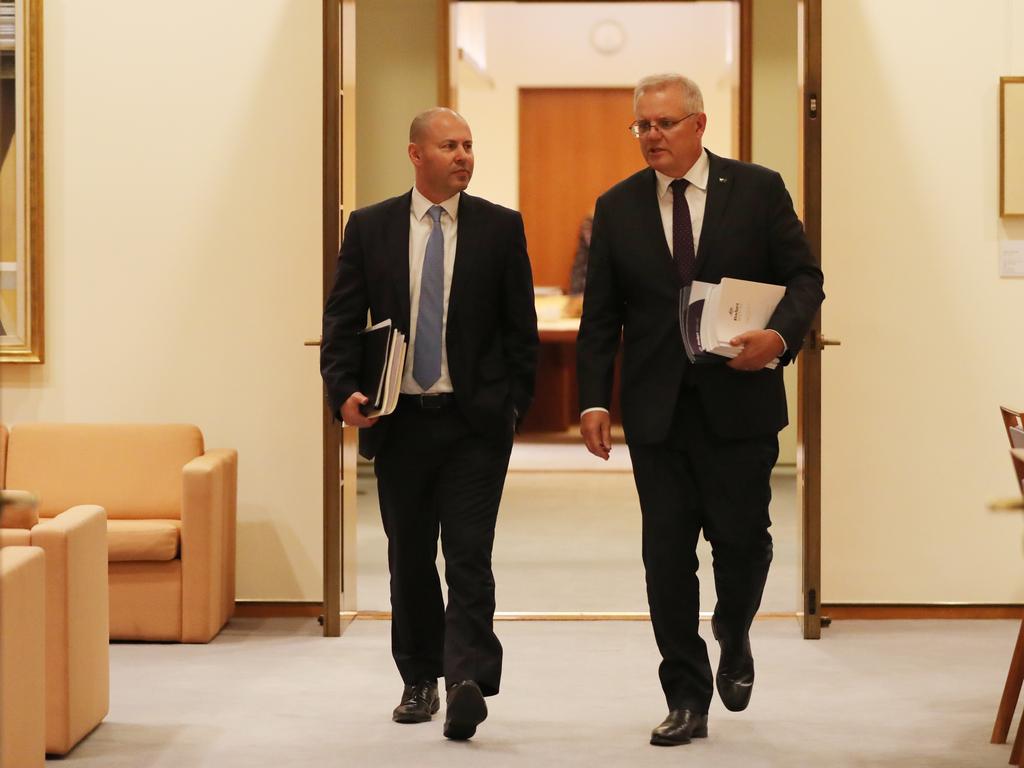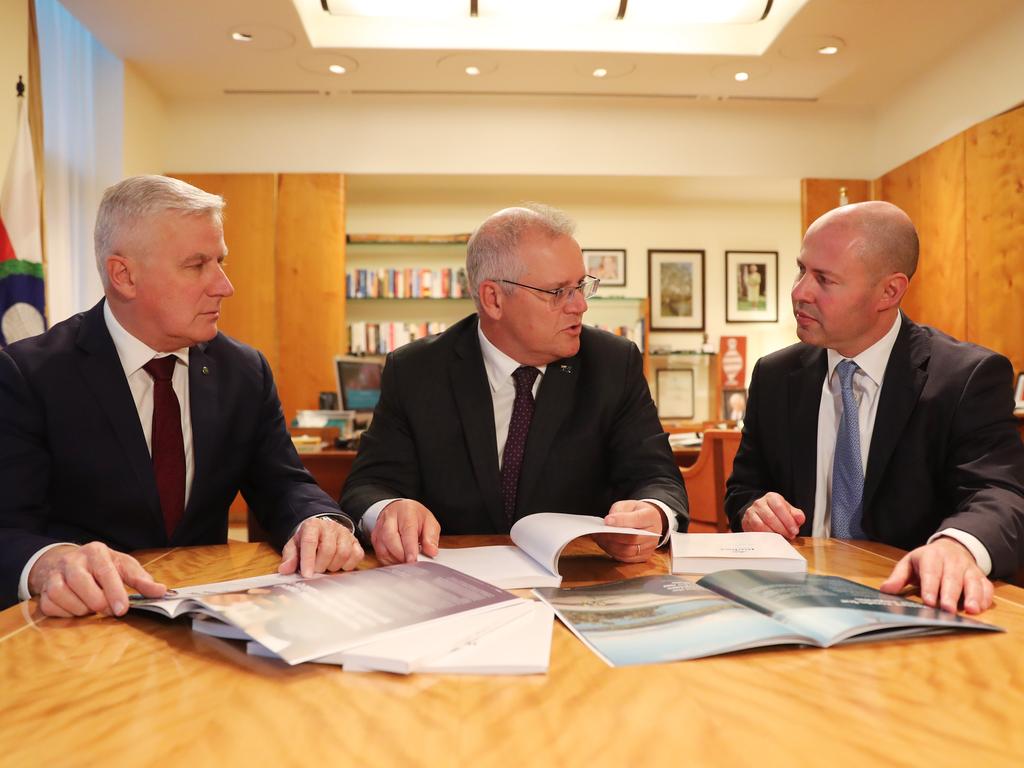Budget 2021: Jobs boom to slash the forecast budget deficit by $53bn
A post-COVID jobs boom will slash the forecast budget deficit by $53bn this year in a stunning fiscal recovery.

A post-COVID jobs boom will slash the forecast budget deficit by $53bn this year, in a stunning fiscal recovery driven by higher income tax receipts and a greatly reduced welfare bill.
The windfall gains booked in just eight months since the height of the state lockdowns will help fund the single largest investment by the commonwealth in essential services, with the budget poised to inject an extra $2.3bn into the mental health system for suicide prevention and urgently needed crisis services.
The mental health package, which will also be pitched as an economic productivity measure, will be a key plank of Scott Morrison’s pledge for a budget focused on services and jobs, framed as Securing Australia’s Recovery and headlined by a $17.7bn aged care policy revealed by The Australian on Monday.
The Australian understands the budget deficit for 2020-21 to be unveiled on Tuesday night will be $161bn compared with the $213.7bn forecast in the October 6 budget. This is a $52.7bn improvement and also accounts for a third stage stimulus spending program ahead of the next election.
The improvement has been driven by the strength of employment numbers, a reduction of the number of people on JobSeeker payments and a lift in company profit tax receipts due to higher commodity prices.
The budget recovery is set to fund a new round of COVID job-stimulus measures for affected sectors — including tourism and hospitality — as well as a massive boost for the funding of essential services.
Amid unprecedented demand for mental health help and calls from the sector for fundamental reform in the wake of COVID-19, The Australian understands the Morrison government will seek to take ownership of the mental health crisis and intervene in the delivery of services.
It is understood that Health Minister Greg Hunt has secured a funding increase equivalent to more than $500m a year, the bulk of which is to be delivered through primary health networks set up by the commonwealth in 2016. The reforms will be aimed at delivering on-the-ground services directly to regional and disadvantaged areas that have the most acute mental health needs and have been the most afflicted by fires, floods and COVID-related and youth unemployment.
Independent modelling in May last year, at the height of the pandemic, suggested that the productivity losses from mental health would amount to $5bn a year without intervention.
The commonwealth currently spends $5.9bn a year on mental health, with $2.2bn going into state hospitals and the remainder to Medicare, pharmaceuticals and only $1bn going into Headspace programs and suicide prevention.
A new national agreement with the states on mental health is due in November, amid demands that the states be more accountable for their spending.
Mental health expert Ian Hickie, a professor of psychiatry at Sydney University and director of the Brain and Mind Institute, said the commonwealth needed to intervene where the states had failed.
“Australia has needed national leadership since the start of this crisis,” Professor Hickie said.
“Prior to COVID we were stuck with state-based responses that could not deal with the community’s genuine and urgent needs.
“Having set up the regional framework through primary networks, what has been required is direct investment from the commonwealth to those regions to put the services on the ground where they are desperately needed.
“It requires prime ministerial leadership, like Howard in the 2000s which he did in partnership with the then NSW premier Morris Iemma.”
Mr Frydenberg on Tuesday will release a stand-alone 50-page statement focused on improving women’s economic security and safety, headlined by a $1.7bn expansion of childcare subsidies and $354m women’s health package. It is also expected to include measures to help boost the retirement savings of women.
The Australian can reveal that, separate to the women’s budget statement, the government will pump funding into supporting legal services ensuring greater access for women and children dealing with family law proceedings and violence.
The women-focused legal package, worth hundreds of millions of dollars, will also boost funding across the family law system, including to federal courts and services outside them.
The government’s response to the Respect@Work: Sexual harassment national inquiry will include budget support to put into action key recommendations made by Sex Discrimination Commissioner Kate Jenkins in her final report.
Ahead of Tuesday’s budget, the Morrison government has announced a $10bn infrastructure package, $1.2bn digital economy strategy, more than $1.3bn for clean energy projects, support for single parents entering the housing market, $1.2bn for businesses and regions impacted by international border closures and a $600m National Recovery and Resilience Agency.
The Australian last week revealed Mr Frydenberg would not bring forward stage three tax cuts for higher-income earners and would instead extend the low and middle income tax offset — worth up to $1080 — for a further year.
The government has also dropped plans to boost or retrofit the $4bn JobMaker hiring credits program - a centrepiece of last year’s budget - which had a low take-up.
With the budget expected to show the unemployment rate falling to below 5 per cent within two years, Mr Frydenberg last week told The Australian he wanted to “consolidate the gains and secure the recovery”.
The budget will show the nation’s $32bn COVID welfare bill was on track to be halved over the next four years, with JobSeeker expected to finish about $4.5bn lower in 2020-21 compared with estimates in December’s mid-year economic and fiscal outlook.







To join the conversation, please log in. Don't have an account? Register
Join the conversation, you are commenting as Logout